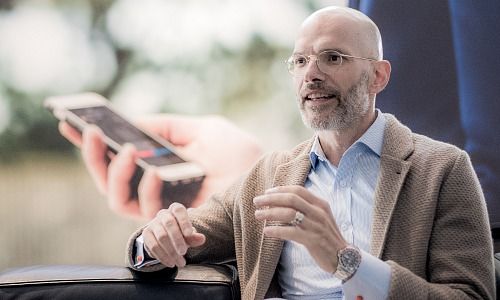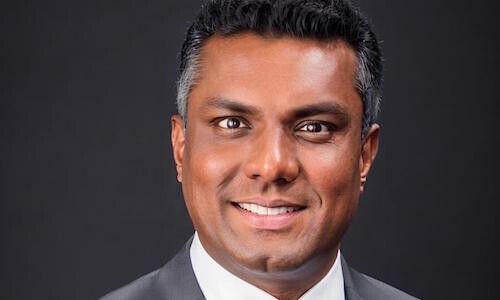Client advisers are increasingly playing psychologist or trusted medical consultant, Saxo boss Patrick Hunger tells finews.asia in an interview. The banks are overwhelmed in handling this development, he says.
Patrick Hunger, last year Saxo Switzerland was the first bank here with a robot to welcome clients, but «Pepper» can no longer be found in your branch in Zurich.
We decommissioned Pepper. We learned a lot in the year we spent tying in a humanoid robot into the client experience. There comes a time where we have to say, «that's enough».
Because the trial failed?
That too. Pepper isn't unique to the finance industry. What's interesting is that most users face the same difficulties – the robot's inability to conduct an unstructured conversation, for example. Clients, in turn, have no problem interacting with technology. So its reasonable to utilize Pepper with clients.
And employees?
We're a digital bank, so our organization and our staff need to be flexible and tech-savvy enough to integrate a robot into the business and to play around with its peculiarities. To tell our employees «let's experiment with Pepper» however proved too demanding in practice because of the uncertainty around handling and the potential outcome.
Interestingly, children respond the best to robots and don't get discouraged if it doesn't know the answer to a question and was silent.
So banks have to awaken the child in their advisers?
Keeping the imagination and curiosity of a child would indeed be of huge value in our business. When I ask job candidates about the future of banking, for example, I hear mostly platitudes. Almost nobody dares to paint a future scenario – even though everyone know that we have no way of knowing the future.
Let's test that very question: what does the future of banking look like?
«Invisible bank» is a term I like a lot. Finance in the future will be missing a lot of what we're confronted with today: branches, client advisers, and physical documents are some examples. But we will also find a lot of new things – technology will help us to finally offer true service and product innovation.
That vision is sure to rankle some colleagues who consider the client adviser sacrosanct. At most, client advisers could be armed with digital help, the thinking goes.
Admittedly, this is one of my favorite topics. The client adviser is a treasure trove in evolutionary terms. He survives over and over and keeps getting redefined – right now, he is getting assigned the role of psychologist and trusted medical professional.
We're at the point where we have to ask our colleagues, «do you truly believe what you are preaching?»
You clearly don't believe it.
With the complexity in banking today, demands on client advisers are superhuman. I always say, advisers cannot «manage» complexity, because none of us – perhaps with the exception of a couple of Nobel prize-winners – can.
The fact that advisers are still at the center of so many business models shows me that banks don't actually know what to do with them.
What are advisers good for?
A client adviser needs to be able to manage emotions. Especially when communicating bad news, a healthy dose of empathy is key. That's why I believe the job will continue to be done by a human.
In ancient times, bearers of bad tidings were executed. That's not really a job to strive for, it it?
Interestingly, it was tech giant Amazon which coined the term «emotional banking». The company is known for successfully awakening emotions through the client experience. In banking, we're still highly tied to structures and trying not to make mistakes.
As a client adviser, I can hardly discuss exploratory options with my clients because I always already know where the journey needs to lead. This is neither playful nor does it arouse any emotions.
Don't tell me the client adviser of tomorrow needs to be a gamer.
That would be a great headline for you! I only said that gamers have wonderful capabilities which could be helpful for us. That's certainly better than transporting dinosaurs into the future and pretending their are psychologists and trusted medical professionals.
Is finance hostile to technology?
No. Historically, banking is even tech-heavy. The challenge today is to exploit the exponential advancement of innovation as a company. Of course, not everyone can do this.
It is crucial to acknowledge that technology is a way or reaching the end goal, but it isn't the goal itself. We see this with the example of data.
How?
Everyone says bank data is valuable.
Isn't it?
Our own data sets will lose significant value in the future. What is valuable is the view beyond one's own data. The ability to analyze data is key. We can already see who is pioneering this shift: J.P. Morgan is working together with Facebook, for example.
If a few big firms lead the way, the dam could break. What would happen is companies like UBS and Credit Suisse were to finally share their data with IT giants – provided clients are willing, of course.
Patrick Hunger was appointed chief executive officer of Saxo Bank (Switzerland) in September 2016. The 47-year-old previously worked for Credit Suisse Trust, most recently as general counsel and member of the management board. He graduated at University of Zurich and holds an EMBA from University of Zurich as well as an Executive Master in organizational psychology from INSEAD, Fontainebleau.



























